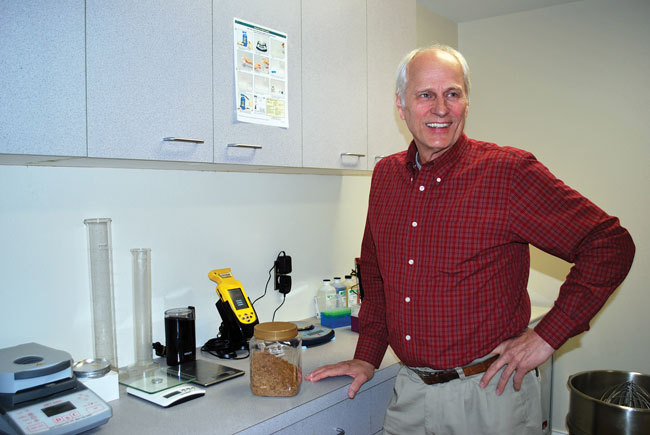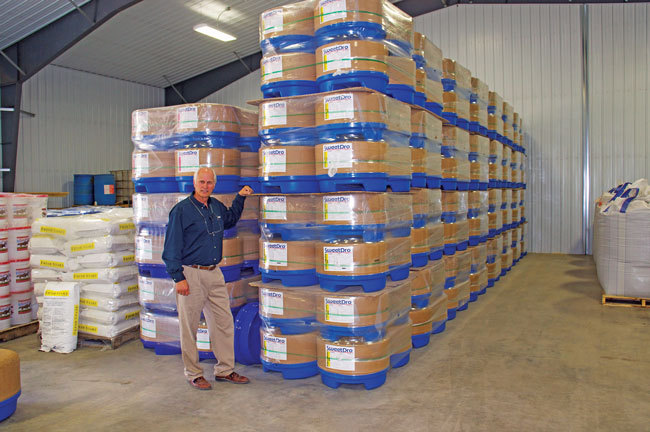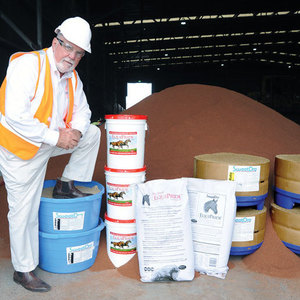From Up North to Down Under With DDGS




May 16, 2016
BY Kassidi Andres
After 30 years in the ethanol business—plant management in the ’80s, lobbying in the ’90s, and running international consulting, media and events companies during the past two decades—there’s no question that Mike Bryan enjoys the challenge of starting a new business when an opportunity knocks. Today, living on the east coast of Australia in Brisbane, the 71-year-old founder and chairman of BBI International, publisher of Ethanol Producer Magazine, has found yet another new way to couple his entrepreneurial predilection with his biofuels connections.
As his sons run the family business back home in North Dakota, Bryan is staying busy in the Land Down Under, working as an occasional biofuels consultant, traveling, writing and playing golf as often as he can. Lately, however, it’s been more work than play for Bryan, since his animal feed import business is starting to flourish, albeit on a small scale for the moment.
Bryan formed his new venture, Pacific Distillers Grains Solutions, in early 2015 after recognizing the vast, untapped opportunity for U.S. distillers grains imports in Australia and New Zealand, a part of the world “with more sheep than people,” he says, and large beef cattle numbers. While Bryan worked through the costs and complexities of importing DDGS into the countries, an ancillary opportunity sprang up.
“An old friend of mine I’ve known for many years, Bob Thornberg, called me up one day and asked if I would be interested in representing SweetPro products in Australia,” Bryan says. “I gave it some thought, and knew it could easily fall under the umbrella of my new company, PDGS. One thing led to another, and we went ahead and did it.”
Bryan and Thornberg go back nearly 30 years. In the late 1980s, both men managed ethanol plants in northeastern North Dakota. While Thornberg was managing the plant in Walhalla, Bryan was managing in nearby Grafton. The two took different career paths, but both ended up owning small businesses with direct ethanol industry ties. Ultimately, a shared professional history made their contemporary business partnership quick and easy to facilitate.
“It’s one of the reasons why I’m so excited about Mike’s involvement,” Thornberg says. “He just really knows what it takes to be in a fledgling industry and how to manage new market development. To connect with somebody who has that breadth of awareness of the industry is just really compelling in my mind.”
Exporting at Last
Founded in 1991, SweetPro and its core products are neither new nor novel. The company’s growing suite of animal feed products are distributed across the United States and Canada via 10 distributors and approximately 150 dealers. Now, after a quarter century of steadily growing domestic sales, SweetPro is expanding globally. The company has finalized agreements in Europe, South America and Mexico. Simultaneously, Bryan is carrying the SweetPro banner in Australia and New Zealand, where antiquated molasses licks are the norm.
“There is no other product like [ours] in the entire country,” Thornberg says.
SweetPro’s products differ from other feed products because they’re made with a combination of distillers grains, vitamins and minerals, beta-glucan and SweetPro’s trademarked ProBiotein additive, with no molasses. The species-specific blends support animal digestive health and growth. The company is best known for its patented 250-pound, cylindrical lick tub, developed to replace molasses with distillers grains and solubles. While an assortment of bagged and loose meal products also is offered—there are 24 SweetPro products in all—lick blocks still are the company’s top seller in the U.S.
Bryan’s early sales in Australia mirror SweetPro’s American trends. Bryan says 85 percent of Pacific Distillers Grains’ sales revenue is coming from lick block sales into the Australian equine market. He anticipates, however, that the sale of cattle lick blocks will capture a larger share of total sales this winter when the pastures dry up and cattle ranchers begin to rely on lick block supplements.
Spreading the Word
Social media has become an important marketing channel for many consumer products, and the animal feed business is no different. Bryan has utilized Facebook and other social media tools to promote SweetPro products within the equestrian community throughout eastern Australia. That’s been effective, particularly when combined with Bryan’s old-fashioned, face-to-face marketing approach. “The world belongs to those who show up,” he says, channeling BBI’s longtime mantra.
Since launching the company last fall, Bryan has attended numerous horse shows, handing out brochures and meeting as many horse owners as he can while sporting SweetPro apparel. Recognizing the value of customer endorsements, Bryan has embraced his adopted country’s equestrian community, and even sponsored a rodeo team.
With a sales strategy rooted in customer education, Bryan likes to tell prospective customers about the nutritional benefits of SweetPro products relative to competing feed supplements. He touts the fact that SweetPro is the only product in Australia that contains distillers grains, and is the only cattle, sheep and horse feed supplement that uses ProBiotein—a prebiotic supplement made using SweetPro’s patented process of fermenting wheat, barley, flax and oats. Both ProBiotein and distillers grains aid in thorough digestion, reducing forage consumption by 25 percent or more.
According to Thornberg, eliminating starch from the diet results in one more consistent with the natural fare of grazing animals. Because their natural diet is grass and hay, grazers are not biologically evolved to consume high amounts of starch or sugar. In addition, products that use molasses as an ingredient do not stay intact in hot weather. SweetPro, on the other hand, holds its shape, rain or shine.
Bryan has received numerous testimonials with positive feedback, and the majority of them have come from horse owners. Many said that their horses’ coats and hooves have never looked better, and their performance improved as well.
Quality, Cost Balance
Like most other feed businesses, SweetPro’s major target markets include horses, beef cattle, dairy cattle, sheep and goats. Hence, the company faces stiff competition. For many horse owners, SweetPro’s advantages outweigh its extra cost.
“For the most part, with a few exceptions, people who own horses are more willing to spend a little extra money,” Bryan says. “Their owners take great care of them and do whatever they can to keep them healthy. I’m not suggesting that cattle people don’t want to keep their animals healthy. They do, but [cattle are] a volume business and input costs are monitored down to the penny.”
Though cattle ranchers will be a harder sell, Bryan hopes they will base their buying decisions on a balance of factors including cost, nutrition, health and growth performance. “We can talk to the cattle folks about the benefits of SweetPro, which there certainly are, but at the same time, you have to be pretty competitive,” he says. “Don’t forget: they’ve been feeding cattle here for over 200 years without SweetPro, so it’s not like it’s a white knight in shining armor that’s going to come in and rescue the cattle business.”
Furthermore, because the cattle business is very competitive, Bryan doesn’t expect his first SweetPro buyers to willingly share their positive experiences with their competitors. While horse owners are inclined to openly share their feed and supplement buying practices, cattle owners are often not, especially if the product is giving them a competitive advantage.
Import or Build?
While Bryan’s new business is picking up, he’s operating it at near breakeven because of the relative high cost and long duration of shipping SweetPro products to Australia and the current unfavorable exchange rate. The delivery life cycle begins when 40-foot containers of product are shipped by truck from SweetPro’s production plant in Horton, Kansas, to a rail yard in Kansas City. From there, they are railed to a port in Los Angeles and shipped across the Pacific Ocean to the Port of Brisbane. After rigorous inspection, the containers are transported to Bryan’s contracted warehouses along the east coast of Australia where the customer picks up the freight to the final destination. “Remember, Australia is the same size as the United States, geographically, so this is yet another layer of cost that we have to factor in,” Bryan says.
With a shipping process that takes nearly seven weeks, inventory management is difficult. That’s why Bryan and others are exploring building a SweetPro product manufacturing plant in Australia. One possibility is establishing a joint venture with a grain sorghum ethanol plant a few hours from Australia’s eastern coast. After early discussions with the plant owners, Bryan believes there may be some interest in placing a SweetPro plant adjacent to the ethanol facility, which would provide a steady supply of affordable, domestic DDGS. A second option would be to locate the plant near the Port of Brisbane, which would allow PDGS to source distillers grains from anywhere.
According to Bryan, the $5 million plant would have a relatively small footprint and be modeled after SweetPro’s Kansas production facility. Thornberg says that while the space required for the production equipment is modest, the operation would require at least 30,000 square feet for storage. With interested investors waiting in the wings, Bryan is evaluating the options while Thornberg stands by with interest.
Historically, SweetPro has not had sales connections beyond the U.S. and Canada, and it has not been involved with production plants that it didn’t directly own and operate. That’s all changing. In addition to the PDGS distributorship in Australia, SweetPro has finalized an agreement that would allow a French and South American company to process its products. The company also recently completed a royalty arrangement with an Arizona ethanol plant that is building a SweetPro plant on site. That facility will produce SweetPro tubs mainly destined for the West Coast and Mexico. In addition, SweetPro recently received approvals to replicate its manufacturing plant in Hungary.
Despite the many unknowns associated with project development, Bryan and Thornberg are enthusiastic about SweetPro’s future in Australia, with or without a manufacturing plant. A decade ago, Bryan could not have possibly envisioned himself marketing American feed products in Australia, but he’s willing to put his other hobbies aside to see the opportunity through.
Author: Kassidi Andres
Editorial Intern: Ethanol Producer Magazine
For questions, comments email:
sretkaschill@bbiinternational.com
Advertisement
Advertisement
Related Stories
The USDA’s Risk Management Agency is implementing multiple changes to the Camelina pilot insurance program for the 2026 and succeeding crop years. The changes will expand coverage options and provide greater flexibility for producers.
EcoCeres Inc. has signed a multi-year agreement to supply British Airways with sustainable aviation fuel (SAF). The fuel will be produced from 100% waste-based biomass feedstock, such as used cooking oil (UCO).
SAF Magazine and the Commercial Aviation Alternative Fuels Initiative announced the preliminary agenda for the North American SAF Conference and Expo, being held Sept. 22-24 at the Minneapolis Convention Center in Minneapolis, Minnesota.
Saipem has been awarded an EPC contract by Enilive for the expansion of the company’s biorefinery in Porto Marghera, near Venice. The project will boost total nameplate capacity and enable the production of SAF.
Global digital shipbuilder Incat Crowther announced on June 11 the company has been commissioned by Los Angeles operator Catalina Express to design a new low-emission, renewable diesel-powered passenger ferry.
Upcoming Events










